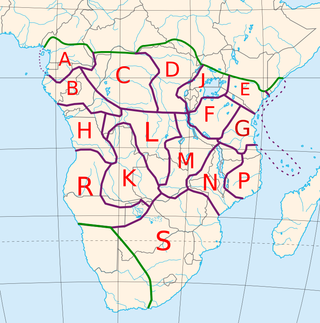Related Research Articles
Kota or KOTA may refer to:
Shira is a Bantu language of Gabon.
Nyanga-li (Linyanga-le) is a Bantu language in Orientale Province, Democratic Republic of the Congo. Gbati-ri (Gbote) is a dialect. Maho (2009) lists them separately as unclassified Zone D.30 languages, but Ethnologue states that they are "members of the same dialect subgroup", and Glottolog places them nearest the Ngendan languages.

The 250 or so "Narrow Bantu languages" are conventionally divided up into geographic zones first proposed by Malcolm Guthrie (1967–1971). These were assigned letters A–S and divided into decades ; individual languages were assigned unit numbers, and dialects further subdivided. This coding system has become the standard for identifying Bantu languages; it was the only practical way to distinguish many ambiguously named languages before the introduction of ISO 639-3 coding, and it continues to be widely used. Only Guthrie's Zone S is (sometimes) considered to be a genealogical group. Since Guthrie's time a Zone J has been set up as another possible genealogical group bordering the Great Lakes.
Kota, or iKota, is a Bantu language spoken by the Bakota people. It is spoken in northeastern Gabon, Ogooué-Ivindo Province and in some areas of Republic of Congo. According to Ethnologue there are 34,442 Kota speakers in Gabon and 9,055 in the Republic of Congo.
Ngando is a Bantu language in the Soko-Kele languages group that is spoken by the Ngando people in the Democratic Republic of Congo.
Yans (Yanzi) is a Bantu language spoken in the Democratic Republic of the Congo by the Bayanzi.
The Ngando people are Bantu subsistence farmers who live in eastern part of Équateur and the western part of Orientale province in the Democratic Republic of the Congo.
The Nen language, Tunen (Banen), is a Bantu language of Cameroon. Maho (2009) considers Aling'a to be a distinct language. Unlike all other Bantu languages, Nen has an SOV word order rather than the standard Bantu SVO word order.
Lala-Bisa is a Bantu language of Zambia that is closely related to Bemba.
Samia (Saamia) is a Bantu language spoken by the Luhya people of Uganda and Kenya. Ethnologue includes Songa as a dialect, but it may be a separate language.
The Kele or Sheke languages are a clade of Bantu languages coded Zone B.20 in Guthrie's classification. According to Nurse & Philippson (2003), apart possibly from Seki (Sheke) (B.21) itself, the languages form a valid node. They are:
The Ngondi–Ngiri languages are a clade of Bantu languages. The Ngondi languages are coded Zone C.10 (Ngondi) in Guthrie's classification. According to Nurse & Philippson (2003), they form a valid node with the Ngiri language(s) of C.30:
The Soko or Soko–Kele languages are a clade of Bantu languages coded Zone C.50–60 in Guthrie's classification. According to Nurse & Philippson (2003), apart from Mongo (Nkundo), the languages form a valid node. They are:
Sonde is either of two Bantu languages of the Democratic Republic of the Congo. Maho (2009) classifies Sonde–Kisoonde as closest to Suku, but lists an adjacent language also called Sonde as closer to Pende. These are not distinguished in Ethnologue or by ISO code.
Lwalu, also known as Lwalwa, is a Bantu language of the Democratic Republic of the Congo. Its classification is uncertain: Nurse (2003), following Ahmed (1995), assigns all of Guthrie's L.20 languages to Luban, including Lwalu.
Bembe (Kibeembe) is a Bantu language of Congo-Brazzaville. It is closely related to Kikongo.
Binji is a Bantu language of eastern Democratic Republic of the Congo. Maho (2009) states that it is close to Songe, which is otherwise isolated within the Luban languages established by Ahmed (1995).
Totela is a poorly described Bantu language of Zambia. Its classification is assumed rather than demonstrated.
Doko is a Bantu language of the Democratic Republic of Congo. Ethnologue 16 classifies it as a dialect of Ngombe language, while Maho (2009) lists it as a separate, though perhaps unclassified, language.
References
- ↑ Ngando at Ethnologue (18th ed., 2015) (subscription required)
- ↑ Jouni Filip Maho, 2009. New Updated Guthrie List Online